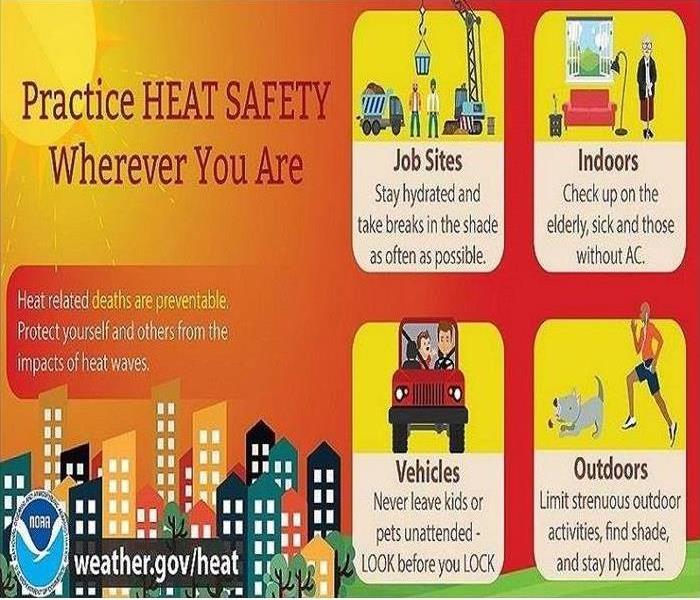SERVPRO of Northwest Bergen Preparedness: Summer Heat Safety
7/1/2021 (Permalink)
Summer is here and it is time to consider safety precautions for extreme heat. Heat affects all people, but is particularly dangerous for the sick, elderly and young. Urban area residents also have a greater chance of being affected than those who live in rural areas due to the heat island effect.According to the EPA, "the sun can heat dry, exposed urban surfaces, such as roofs and pavement, to temperatures 50-90° F hotter than the air, while shaded or moist surfaces often in more rural settings remain close to air temperatures."
Whether you are in an urban or rural area, there are several things you can do to prepare for an prevent extreme heat from affecting you and your family. If possible stay indoors I the air conditioning. Remember to bring your pets indoors, or have shade and water available for them at all times. Stay hydrated and limit alcohol and caffeine intake.
If you must venture outdoors, wear light-colored, and loose-fitted clothing. It is also important to wear sunscreen when outdoors, and follow the instructions for application.
Pay attention to signs of heat exhaustion, which include: heavy sweating, weakness, cold, pale and clammy skin, nausea or vomiting, and fainting according to the Center For Disease Control And Prevention (CDC). Heat exhaustion can lead to heat stroke, which is life-threatening. Signs of heat stroke are a high body temperature (103°+), rapid and strong pulse, and possible unconsciousness. If you think someone has heat stroke, call 911 immediately and move the person somewhere cool. Try to reduce the body temperature with cool, wet clothes or a bath. Do not give the person with heat stroke fluids, and treat the situation as a serious medical emergency. (CDC)
If you live in a humid climate, be aware of the heat index. The heat index factors in the humidity, which can make the temperature feel 15° hotter.
Extreme Heat Safety Tips to Prepare Your Home
- Install window air conditioners snugly, insulate if necessary
- Check air-conditioning ducts for proper ventilation
- Install temporary window reflectors (for use between windows and drapes). Aluminum foil covered card board can be used to reflect heat back outside.
- Cover windows that receive morning or afternoon sun with drapes, shades, awnings, or louvers, to reduce the heat that enters a home by up to 80%.
source ready.gov
Extreme Heat is a serious danger. For more information on preparation and prevention, visit https://www.ready.gov/ or https://www.cdc.gov/disasters/index.html




 24/7 Emergency Service
24/7 Emergency Service
